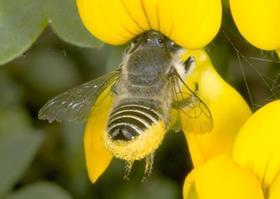
Research in India has shown that a drop in pollinating insect numbers is reducing Indian vegetable yields, reports the BBC.
A recent study by the University of Calcutta found a clear link between pollinator abundance and vegetable productivity, against a backdrop of a greater area being turned over to crop production each year.
The findings have led researchers to warn that the loss of pollinators, such as bees, could have a long-term effect on India's farming sector, which accounts for almost a fifth of the nation's GDP.
However, employing environmentally-friendly, integrated production methods, or 'ecological farming' does seem to boost pollinator numbers, the study claimed.
'We - not only in India, but in other parts of the world - do not really know what is happening to natural pollinator populations,' said Dr Parthiba Basu of the University of Calcutta. '`But` there is an obvious indication that within the ecological farming setting, there is pollinator abundance. This method typically provides the habitats for natural pollinators - this is the way forward.'
He added that ecological farming was only practised on 10-20 per cent of the country's arable land.
According to the UN Food and Agriculture Organization (FAO), bees pollinate 71 of the 100 crop species that provide 90 per cent of food supplies for 146 countries.



